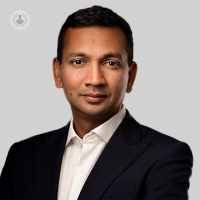Dyslexia: An opthalmology perspective
Written in association with:Learning to read marks a pivotal milestone in every child's educational journey, yet for those with dyslexia - a neurobiological disorder affecting 80 per cent of individuals with learning disabilities - it presents distinct challenges. In his latest online article, Mr Saurabh Jain gives us his insights.

The essence of dyslexia
Dyslexia is characterised by difficulties in accurately recognising words, spelling, and decoding, despite normal intelligence. It stems from a phonemic deficit, impairing the ability to process the sound structure of language effectively.
Insights from research
Scientific studies highlight the efficacy of systematic phonics-based approaches in teaching reading, as emphasised by the influential 2000 report from the National Reading Panel. These methods are pivotal in improving reading skills in children with dyslexia, focusing on decoding, fluency, vocabulary, and comprehension.
Neurological perspectives
Functional MRI studies reveal distinctive brain activation patterns in individuals with dyslexia, indicating altered processing pathways. This insight highlights the need for tailored educational strategies that accommodate these neurological differences and promote compensatory learning methods.
Early detection and intervention
Early identification of dyslexia symptoms—such as difficulty with rhyming, letter recognition, or reading fluency—is crucial for prompt intervention. Structured phonics instruction and personalised remedial programs significantly mitigate academic challenges associated with dyslexia, improving long-term educational outcomes.
Collaborative approach in education
Effective support for dyslexic students necessitates a multidisciplinary approach involving educators, psychologists, and therapists. This collaborative effort ensures comprehensive assessment, individualised education plans (IEPs), and inclusive classroom strategies that cater to diverse learning needs.
Dispelling myths about visual deficits
Contrary to popular belief, dyslexia is not caused by visual acuity issues or eye disorders. Extensive research confirms that reading difficulties primarily stem from linguistic and neurological factors rather than visual impairments, debunking misconceptions surrounding visual deficits in dyslexia.
Role of parents and physicians
Parents play a crucial role in advocating for their children's educational needs and collaborating with educators and healthcare providers. Paediatricians facilitate early detection through developmental assessments and referrals, ensuring timely support and intervention strategies tailored to each child's unique needs.
Empowering individuals with dyslexia
By embracing evidence-based practices and fostering inclusive educational environments, we empower individuals with dyslexia to overcome challenges and achieve academic success. With concerted efforts, we can bridge the reading gap and unlock the full potential of every learner.
Understanding dyslexia requires a nuanced approach that integrates scientific insights with compassionate support, aiming to create equitable opportunities for all children in their educational pursuits. Through ongoing research and collaborative efforts, we continue to enhance our understanding and support for individuals with dyslexia, striving towards a more inclusive and supportive educational landscape.
Mr Saurabh Jain is an esteemed adult and paediatric ophthalmologist. You can schedule an appointment with Mr Jain on his Top Doctors profile.


